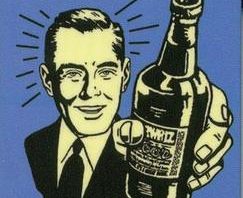Alcohol and the problem of alcoholism has been a problem for years and this problem is definitely not on the decline. Our society today in the U.S. seems to be adopting alcohol consumption as a major part of social interactions, making it socially expectable for individuals to consume copious amounts of alcohol and act silly. Throughout the past week our neurochemistry class has been diving deep into a paper that talks about just what alcohol does in the body and also yields new information on some possible ways to fix this growing problem of alcoholism.
The main point of the alcohol review that we dissected regarding the neurochemical systems involved talked about the two separate waves of responses due to alcohol consumption. The first hit of the alcohol acts on specific targets in the brain resulting in the stimulating properties of the drug triggering the intoxication signals such as sedation and hypnosis. The second wave of the alcohol consumption comes with effects on a variety of neurotransmitters and neuropeptide systems such as NMDA receptors and GABA, causing NMDA receptors to be inhibited and GABA to be increased. This second wave primarily involves monoamines, opioids, and endocannabinoids. The second wave is the main one that is responsible for alcohol reinforcement and reward. Another very common piece that is important in the effects of alcohol is PKCa. It is proven that by inhibiting this PKCa it is possible to decrease self-administration of alcohol.
Now that we know a bit about how alcohol works in the body and brain we can understand what scientists are looking at when trying to develop a therapy for alcoholism. One of the main targets is the PKCa that I mentioned before. There is a possibility that by creating a drug to inhibit this PKCa it would be possible to counteract the want for alcoholics to self-administer alcohol. This would be a revolutionary therapy as making it possible for alcoholics to not want to consume alcohol would be very beneficial in stopping alcoholism.
Although the thought of developing a drug to treat alcoholism sounds very appealing, I feel as if there are better options out there for decreasing our growing problem of alcoholism. In one of our discussions in class we talked with a couple students that studied abroad in Ireland about the differences in alcohol consumption. Even though Ireland consumes more alcohol per capita than the US these students felt as if the style of consumption was much different in Ireland and that the US creates a sort of attitude toward alcohol that makes it seem as if we have to drink to get drunk rather than casually drinking socially. This was a very interesting point that we discussed thoroughly trying to figure out why this is. The only thing we could narrow down was that the drinking age in Ireland is much lower so it isn’t such a big deal when young adults can finally drink in Ireland, making it feel as if it isn’t near as big a thing. I’m not saying that lowering the drinking age in the US would decrease the alcohol problem but it is a very interesting topic.
All in all it will be very interesting to see if scientists will in fact be able to come up with a drug to counteract alcoholism and whether or not the rate of alcoholism in the US will continue to rise in years to come.
Is alcoholism a forever problem in the U.S.?
